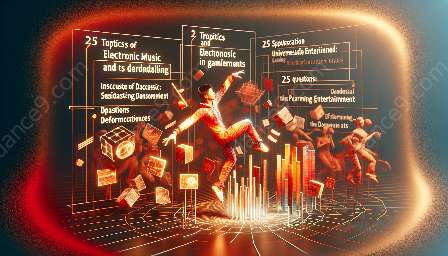Music and dance are intertwined art forms, and the use of electronic music and performance techniques has expanded the creative possibilities for choreographers and dancers. In the realm of electronic music and dance, the practice of sampling music has become increasingly common. However, this practice raises a number of ethical considerations, especially in relation to copyright laws and artistic integrity.
The Intersection of Dance, Electronic Music, and Performance Techniques
Dance and electronic music have coalesced to create a dynamic and innovative entertainment experience. The fusion of these art forms opens up a world of creative expression, allowing choreographers and dancers to explore new dimensions of movement and rhythm. Electronic music provides a diverse range of sounds and beats that can inspire unique choreographic ideas, while performance techniques such as live mixing and audiovisual manipulation contribute to the immersive nature of dance performances.
Essence of Sampling Music in Dance Performances
Sampling music involves the use of pre-recorded sounds or music clips within a new composition. In dance performances, sampled music can enhance the overall atmosphere, rhythm, and narrative of the choreography. It offers choreographers the opportunity to create evocative and eclectic soundscapes that complement and uplift the visual storytelling of their dances. Moreover, sampling also allows for the integration of diverse musical genres and cultural influences, enriching the dance experience.
Ethical Considerations for Sampling Music
When incorporating sampled music into dance performances, several ethical considerations come into play:
- Copyright Laws: Sampling music involves using copyrighted material, and choreographers need to ensure that they have the appropriate permissions and licenses to use the sampled music in their performances. Understanding the legal implications of sampling is crucial to avoid copyright infringement.
- Artistic Integrity: While sampling can be a powerful creative tool, it is essential for choreographers to consider the ethical implications of appropriating others' musical work. Respecting the original artists and their creative rights is fundamental to maintaining artistic integrity in dance performances.
- Transparency and Attribution: Acknowledging the original sources of the sampled music and providing proper attribution is vital. Transparent communication regarding the use of samples fosters ethical practice and reinforces respect for the original artists and their contributions.
- Cultural Sensitivity: Sampling music from diverse cultural backgrounds requires a nuanced approach. Choreographers must be mindful of the cultural significance and context of the sampled music, ensuring that its incorporation into the dance performance is done with respect and understanding.
Building Ethical Awareness
As the intersection of dance and electronic music continues to evolve, it is crucial for artists, choreographers, and performers to engage in dialogue about the ethical implications of sampling music. Building ethical awareness within the creative community fosters a culture of responsible and respectful artistic expression. Collaboration with musicians, composers, and legal experts can help navigate the complexities of sampling while upholding ethical standards.
Conclusion
The creative synergy between dance, electronic music, and performance techniques offers endless possibilities for artistic innovation. Ethical considerations surrounding the sampling of music in dance performances emphasize the importance of upholding legal compliance, artistic integrity, transparency, and cultural sensitivity. By embracing ethical awareness, the dance community can enrich its creative endeavors and contribute to a culture of ethical practice and mutual respect.






























